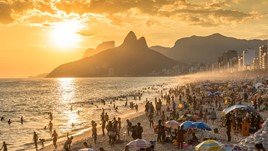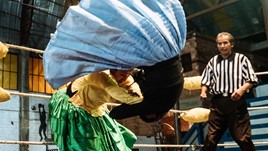
By Rebecca Wilson
Travel Writer19 Sep 2017 - 5 Minute Read
Everything on my plate is beige, again. That’s five days now. I’ve come to realize that I am at greater risk of dying of malnutrition than getting caught in the crossfire of one of the gangs that control the neighbourhoods. Like the vegetables, the guns here are well hidden.
When I meet friends in the wealthier districts they are amazed that I live to see the end of each day; to the Cariocas a favela is a no-go-zone, but in truth I am safer in Rocinha than on the Copacabana. Here I am part of the community, I am teaching their kids. Anywhere else I’m just another gringa tourist.
Rocinha is the land that Google Maps forgot. With few street names I navigate by memory and landmarks; left at the big trash pile, right at the S-curve, through the chicken run, down Penrose Stairs. A concrete labyrinth held together by string, dog feces and good will. Environmental Health would have a field day here, that is, if Health and Safety applied to the favelas. The desire or facility to enforce it simply does not exist.
There is an unspoken rule that the gangs stay away from the schools, but nonetheless we organize an after-school disco when gunfire breaks out at the end of the day. We can hear the fireworks above Justin Beiber, but the children do not seem to notice, or perhaps they have become accustomed to the violence. Differences are settled quickly, and we call the parents to tell them it is safe to collect their children. Life in Rio’s largest favela carries on amongst the chaos.



I meet the adult students at a language exchange and discus the day’s events. There is no excitement or fear. It is matter of fact; these things happen, it is part of favela life. I chat with Obi, a 21 year old entrepreneur. His father was killed when he was two and he organizes favela tours for curious tourists to dispel the myths surrounding his home but also, he admits, to make a living. He is rightfully proud when he tells me he is not living the life that the favela had planned for him.
Lou owns the bar next to our apartment; little more than a shoe-box with a few plastic chairs. We visit her most days, and she cooks us traditional dishes on the house. She wants to make sure we come back. On the portable television, we watch Rafaela Silva, a girl from the favela, break down on the podium as the home nation wins their first gold of the Olympic games. There isn’t a dry eye in the house. Lou smiles and tells me, “She’s doing this for all of us. Perhaps we'll matter now.”
Discover similar stories in
discovery
Travel Writer
Rebecca works in the UK charity sector and is a trustee at The Favela Foundation. She recently returned to London after a ten-month trip in South America.




No Comments